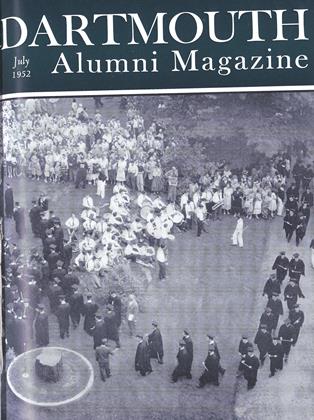by FranciscoUgarte. New York, The Odyssey Press, 1952,302 pp. $2.50.
The appearance of this book by Professor Ugarte will be particularly gratifying to American students. The author has tried to present the bare essentials of Hispanic civilization so it can be handled by the average American student with a minimum of Spanish vocabulary and with a relatively easy idiomatic structure.
Professor Ugarte, a native Spaniard, a Basque by birth and a Castilian by choice, is very qualified to write intimately about a subject which unfortunately has been heretofore so grossly misunderstood. Thousands of Americans still picture Spain as nothing but the land of gypsies and inquisitors, bullfighters and castanets, where people spend half of their time sleeping the "siesta" and the other half trying to overshadow the feats of Don Juan. This book quickly dispels any such misconceptions by offering a comprehensive panorama of the cultural heritage of Spain in a simple, yet vivid and suasive style. I cannot recall a book which garnered so many basic facets of Hispanic civilization in such a limited number of pages. And all presented in such a stimulating fashion that you cannot help but be encouraged to read further into the subject. He writes with unfailing interest and with a natural patriotic fervor always, tempered with tolerance and objectivity. His frankness and clarity of expression are noteworthy. He never allows his own personal feelings to becloud the issues.
The contents of this book range from one chapter on the Geography of Spain, through five chapters on her history and six chapters on her literature and art, to a chapter on bullfighting. Of unusual interest are the chapters on Education and The National Economy, subjects which are hardly touched upon in books of this nature. The last chapter of the book which deals with the Character and Life of the Spaniards is perhaps the best and most personal of all. Spanish America is treated rather succinctly in two chapters embracing the period 1492-1898 and only to show the outstanding features of the contribution of Spain to America as the book does not pretend to go beyond the peninsular periphery.
At the end of each chapter there is a list of "Temas de Conversation" and questions in Spanish. The author has made a conscious effort to refrain from burdening the mind of the student with too many names and dates and has tried to keep them to an indispensable minimum.
In all, an enlightening and very readable exposition of the cultural contribution to humanity of that great nation which, although it is now passing through one of its lowest phases in history, will, no doubt, taking into account such a brilliant prologue, demonstrate again the greatness of her men and their achievements.
Professor Ugarte's book is an accurate and unbiased account of Hispanic civilization with which every student of Spanish should be well acquainted for it will give him the basic elements to understand, as he puts it, "the background and spirit of the Spanish language itself."
 View Full Issue
View Full Issue
More From This Issue
-
 Article
ArticleThe Fifty-Year Address
July 1952 By E. BRADLEE WATSON '02 -
 Article
ArticleThe 1952 Commencement
July 1952 -
 Article
ArticleBaccalaureate Address
July 1952 By SIR OLIVER S. FRANKS -
 Article
ArticleDartmouth Awards Mine Honorary Degrees
July 1952 -
 Class Notes
Class NotesThe Big 25th for 1927
July 1952 By DOANE ARNOLD '27 -
 Class Notes
Class NotesA Glowing 190 7 Report
July 1952 By H. RICHARDSON LANE '07
Books
-
 Books
BooksWHO'S WHO AMONG THE MICROBES
MARCH 1930 By A. H. Chivers -
 Books
BooksBUCKS COUNTY: PHOTOGRAPHS OF EARLY ARCHITECTURE.
January 1975 By JOHN HURD '21 -
 Books
BooksTHE TRANSPORTATION ACT OF 1958.
APRIL 1970 By MARTIN L. LINDAHL A.M. '40 -
 Books
BooksREAL ESTATE PRIMER.
March 1962 By NORMAN STEVENSON '05 -
 Books
BooksPARKER ON THE IROQUOIS. IROQUOIS USES OF MAIZE AND OTHER FOOD PLANTS. THE CODE OF HANDSOME LAKE, THE SENECA PROPHET. THE CONSTITUTION OF THE FIVE NATIONS.
JULY 1969 By ROBERT A. McKENNAN '25 -
 Books
BooksINVESTMENTS: NEW ANALYTIC TECHNIQUES.
APRIL 1972 By WILLARD T. CARLETON '56, T'57


